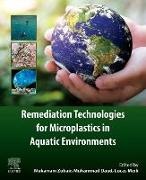Read more
Remediation Technologies for Microplastics in Aquatic Environments examines up-to-date technological innovations and their applications for the mitigation of Microplastics Pollution (MP). With a strong focus on the governing factors influencing the performance of remediation techniques (encircling microplastic characteristics, reactor design, and process parameters), this comprehensive guide presents necessary information on current remediation technologies designed for the removal of MPs from water bodies and comprehensively addresses the fate and impact of microplastics in the environment. The book is divided into three sections: 1. Microplastic pollution, sources, regulation, and analysis, 2 Microplastic Mitigation Technologies and Applications, and 3. Microplastic environmental impacts, toxicology, and risk.
The meticulous use of detailed case studies, the diverse list of experts in the field, and the clear structure of the book, equip the reader with tools for implementing sustainable and effective solutions crucial for the treatment of water and contaminated wastewater, making this book a valuable resource for students and researchers learning about successful strategies for microplastics removal.
About the author
Dr. Mukarram Zubair, is a senior lecturer in Environmental Engineering at Imam Abdulrahman Bin Faisal University, Dammam, Saudi Arabia. He received a doctoral degree in water and wastewater treatment. He gained over five years of teaching and research experience working on nanostructured materials/membranes, water remediation, and carbon capture. Research is based in the chemistry/chemical and environmental engineering domain, with a strong background in advanced and porous materials fabrication and characterization, wastewater purification, CO2 capture, and carbon-neutral concrete. Research interests include the development of advanced materials (e.g., nanostructured materials, nano clays, nanocellulose) and membranes, removal of emerging contaminants from water and wastewater by physical and chemical techniques, and direct air capture and carbon-neutral concrete. Dr. Mukarram, co-authored over 60 international peer-reviewed articles and listed among the world's top 2 percent of scientists and holds 8 U.S. patents on sustainable wastewater treatment and construction.
Dr. Muhammad Daud is an Associate Professor of Chemical Engineering at the University of Engineering & Technology (UET) Peshawar Pakistan. He received his Ph.D. degree in Chemical Engineering from King Fahd University of Petroleum and Minerals (KFUPM), Saudi Arabia in December 2016. His research focuses on the development of layered double hydroxide (LDH) modified with 2D and bio-based hybrid nanocomposites, and their applications in the field of polymer nanocomposites, water treatment and energy applications. His research directly applies to the sustainability and remediation methods, playing a pivotal role in advancing more effective techniques and materials for treating water and polluted wastewater. He completed his post doctorate at the Interdisciplinary Research Center for Refining & Advanced Chemicals (IRCRAC), KFUPM in August 2023.
Lucas Meili is Professor in the Center of Technology at the Federal University of Alagoas, Maceió, Brazil. His areas of interest are focused in separation processes, water and wastewater treatment, and synthesis of materials, with a particular interest in adsorption and advanced oxidation processes.

